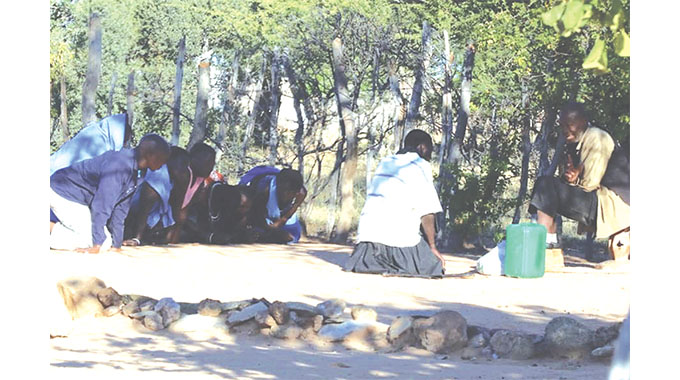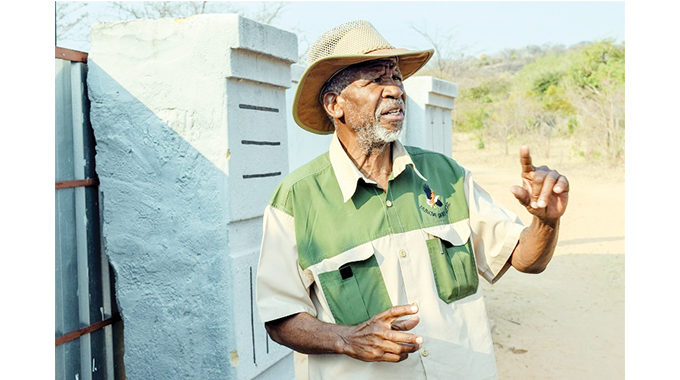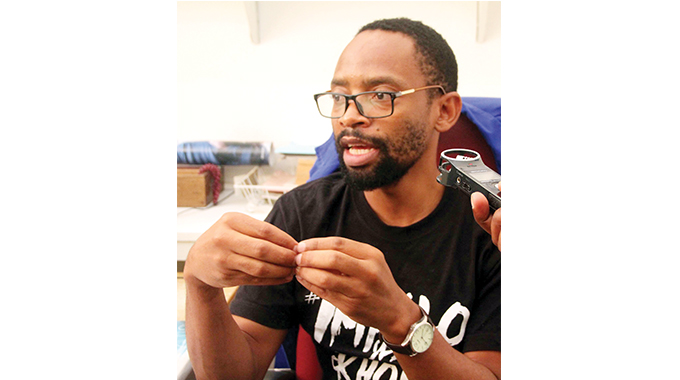KoManyangwa: Njelele twin shrine in Bulilima District

Mkhululi Ncube, Chronicle Reporter
TRADITIONAL shrines have over the years played a crucial role in the beliefs of the indigenous people and had a great pulling power before the advent of Christianity which revolutionised not only the beliefs but also cultures that obtained.
In Matabeleland, the magical powers of Njelele in Matobo are well documented and its prowess in rain-making is legendary to those dipped in traditional religion.
A voice is said to have been heard from the rock directing affairs to those who visited the shrine to consult when met with life challenges.
When the land became dry with no rain, cultural ceremonies were performed to plead with ancestors and ask for umdaka (the rain) and soon after the ceremony, it would rain.
Njelele gained national acclaim as people from all over the country flocked its revered shrine for consultations which unfortunately led to its desecration in the past few years.
What might be unknown to many is that the voice also used to direct affairs of the people in the heart of the Kalanga speaking community and beyond.
Popularly known as koManyangwa, a Kalanga name which means to be entered, the place holds solutions to many troubled people who believe it has answers to their problems.
The shrine is located in Tjehanga Village, some 30km from Plumtree town to the north.
Wanting to unravel what goes on at the place, we took a journey to KoManyangwa last week on Monday afternoon.
Our first stop was at Bhangane Business Centre where we stopped to ask for directions and before the two ladies we had asked could respond, an old lady who was by the gate of her homestead interjected and said, “UManyangwa ulaphana emfeni.”
We politely requested her to help call him for us, thanking the heavens we could have gone to the place, leaving him behind.
After a few moments, a notable tall old man whom I first suspected was unwell because of the zig-zag walking he did, came out of the homestead where there was a funeral, supporting his frame with a stick.
He was accompanied by two mature ladies and the old lady who had gone to call him on our behalf.
“Ndibo banomuhaka hhaba,” (These are the people looking for you) said the old lady as she turned away, leaving us with the man and the two ladies.
His dressing did not match the image we had in our minds as he appeared a modern man: he wore an ankle-long light brown Timberland shoe with matching socks, a black pair of trousers, a black and white-striped shirt and a khaki jacket.
After exchanging pleasantries and without him waiting for us to introduce ourselves and why we were looking for him, he went to the front and demanded a seat there.
My colleague, the photographer, grudgingly ejected himself from his vintage position of taking pictures when the car is in motion.
I was to later understand why he demanded the front seat, his knees reached his chest height while seated in the car, he would have had big trouble at the back seat.
Then the short-to-medium journey to his homestead began and all the way he was cracking jokes.
Arriving at the homestead located near some mountains, a donkey-drawn scotch cart was parked outside with about eight people wearing mostly black and blue ancestral garments waiting by.
We later learnt these were the rainmakers who are called oThobela or Amawosana.
As the tall guest in the car disembarked, they all fell to their knees and mumbled what we thought were praises.
He did not give much notice to them and went straight to the gate, myself following behind.
All the modernity we had seen in him started to disappear as we entered the homestead.
I was ordered to remove my shoes and socks and leave them by the gate while my colleague remained in the car; taking pictures of the surroundings.
The visitors we found outside the homestead moved to the gate where they knelt again and clapped hands accompanied by the words:
“Thobela, Dziba levula . . .,” and the old man responded by saying “Thokoza”, after which he gave them the permission to enter the homestead.
Because we were first to enter the homestead, they found him seated on the traditional chair and me struggling in my sitting position on the ground as I was not afforded the courtesy of a chair.

Khulu Manyangwa
I later realised that this was the lot of all men who come to the homestead as a way of respect to him. The two ladies, MaDumani and MaMlalazi, sat on goat-skin mats.
Khulu, as he was addressed by everyone then sent uMaDumani to bring him his black garment from the ancestral home which he wore on his shoulders.
After putting it on, he seemed to change his behaviour as if one possessed and demanded that we move to a big tree next to the homestead.
I followed him and came to a pathway made of stones which directs people on how to reach the tree. He jumped the pathway but ordered me and those following to use it.
Because we were pressed for time as we had covered another assignment before coming to the place, our wish was to try and make maximum use of the time before driving back to Bulawayo.
This drew a blank from uKhulu uManyangwa chiefly because he had been drinking beer at the funeral and his mind was no longer sober, and he thought I had come for consultations.
Even after trying to convince him that we were on a work assignment, he seemed interested in reading both my future and past declaring that I was a great person.
After almost an hour of going back and forth with him, he then demanded that I pay for “the consultation” we had had. Wanting to set myself free from his presence, I lied that the money was in the car and he allowed me to go and collect it.
As I reached the car, uMaDumani and uMaMlalazi who remained at their position sensed that I was not getting what I wanted as they could easily pick what Khulu was saying.
They called me to where they were seated and after some inquiry they then said, “Hlala lapha sizalincedisa”, which was a huge relief.
After spending a few more minutes with Amawosana, who had just come to report back to him that they are back from where they had gone as we learnt is the norm, Khulu came and joined us.
The two old ladies then tried to explain to him why we were at the homestead and ‘‘rebuked’’ him for attending to us together with Amawosana instead of separating us.
They then took over the proceedings after apologising to him that this was not a sign of disrespect to him but wanted to assist as he did not seem to be in a position to do so.
“This place is called KoManyangwa and Khulu is the third generation of uManyangwa. It is a very popular place, not only here in Plumtree but beyond, even foreigners come here for consultations. Long back the late former Vice-President Dr Joshua Nkomo used to come here as well. These days his son Sibangilizwe, many politicians and ordinary people come.
“A very good number also comes from Botswana, South Africa and in 2019 we received four white men from Britain who came to consult at this place,” said MaDumani.
MaMlalazi said the four white men created some fascination at the homestead as there was a struggle in communication and when they had to sleep in mud huts and have a taste of the traditional food.
She said Njelele was the headquarters long back but after the desecration, KoManyangwa seemed to have overtaken Njelele in terms of popularity.
MaDumani said in the past, the voice used to speak from the nearby mountain but that voice later switched to human beings with uKhulu now the medium.
“UKhulu receives all the people and is able to read their issues and give them solutions. He goes to the mountain after every visit to report to the rock. Many of the people who come here with their problems return to thank him when their issues have been resolved,” she said.
The Manyangwa homestead, while surrounded by many modern homesteads, still maintains the old set up with all houses built from pole and dagga and are thatched with grass.
According to MaMlalazi, the homestead cannot transform to use modern materials like zinc or asbestos and all visitors have to maintain some strict protocols.
“Ngumuzi wamasiko, the sound of asbestos and zinc makes noise which is not wanted by ancestors. All married visitors here cannot sleep together as a couple. They must not have sex in this homestead. We have separate rooms built for females and males,” she said.
MaDumani said people visit the homestead, which is a holy shrine, to present to Khulu Manyagwa their petitions like family, marriage problems, looking for jobs, and various other challenges which uKhulu pleads on their behalf to the ancestors.
The homestead is at the heart of rain-making ceremonies as well.
She said the Manyangwa shrine is opened every August 10 to October 10 which is the time when Amawosana come from all over to perform the rain making ceremonies.
“Communities brew traditional beer which they bring here. It is only Amawosana who come here to request for the rains. They have their sacred place where we built houses for them. They stay there and only come here to report and consult with Khulu Manyangwa. Khulu is the only one who goes to talk to the rock,” she said.
MaMlalazi said once Khulu had reported, they go back to their place where they do traditional dances associated with rain-making and once all is done, they return to their places.
She said during the farming season when it does not rain, Amawosana return to the shrine to plead for rains even when the shrine is closed.
“Khulu Manyangwa will direct them to clean the environment, removing bones of dead animals, plastics, trees that would have been struck by lightning. Once this is done, they will report back and the rains will come,” she said.
MaMlalazi said politicians who come to the shrine are not allowed into the homestead wearing their party regalia.
So powerful is the place, according to MaDumani, that many people who come with their problems return to bring thanks offerings.
She said two years back, a woman who had struggled to conceive for years came to the shrine recently carrying twins to thank uKhulu for the miracle.
The two said Sundays and Wednesdays are closed for any kind of consultation at the shrine as Khulu will be resting.
They said Khulu Manyangwa, who is a widower, eats traditional food only and does not use a cellphone.
“He does have a cellphone but does not use it. If there is a message for him, people phone us then we relay the message to him. Even his children who are outside the country do not talk to him over the phone. They pass the message. The ancestors do not want him to use that,” she declared as Khulu Manyangwa nodded in agreement.
As we were about to finish up the interview, a Honda Fit dropped off a lady in her mid-30s who after inquiry said she was coming from Sabelo Village in Mangwe District.
Renowned historian Mr Phathisa Nyathi said the country has many such shrines but they are under threat from modernism and Christianity.

Mr Pathisa Nyathi
“These shrines are important in the sense that this is where rains are requested at. All life is dependant on the rain and without it, there is no life. It is not only Njelele and Manyangwa shrines; we have many such around the country and besides rain, people would present their challenges,” he said.
“I do not believe it is wise for the government to be involved anyhow or do anything to prolong their longevity. Once politics come into play, it will compromise everything. It is good we still have people who go there for consultations but due to Christianity those numbers are reduced.” — @mkhust








Comments